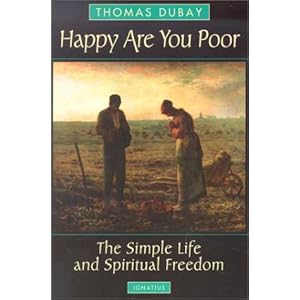Continuing with my reading of Thomas Dubay's book Happy Are You Poor: The Simple Life and Spiritual Freedom, I wanted to touch on his chapter about what does not characterize Gospel poverty. He makes nine points (quotes are directly from the book):
1. Filth, carelessness, laziness, disorder
Living in squalor with counters full of last week's dirty dishes and old, broken items littered about the yard is not living the Gospel poverty ideal. "From seeing in the mass media so frequently the coexistence of filth and poverty, we easily infer an inner connection between them. There is no basis in the New Testament for this connection."2. Destitution
Rather than compel us to live without the very basic necessities (clothing, food, shelter), the Gospel teaches us to attempt to "rub it out wherever it exists." We can live the Gospel poverty ideal without being utterly destitute ourselves. (Although there are some people who will be called to embrace such a lifestyle, such as St. Benedict Joseph Labre.)3. Miserliness
Avarice is a sin, not a virtue. The goal here is not to be a Mr. Scrooge, but one who has no love of money so that we can freely part with it in order to benefit others.4. Being economical
Carefully using money and material goods is good, but it is not automatically synonymous with Gospel poverty. "One who is living the New Testament teaching will usually be economical in his use of creation, but it may possibly happen that what is more economical in a given case may be less in accord with Gospel poverty. An expensive, heavy car may last as long as two small ones, and thus be more 'economical,' but it does not follow that people with a vow of poverty ought to buy the former."5. Being (merely) detached
Anyone truly striving to live the Christian life should have as their goal a true detachment from money and material things, for without it we cannot wholly love God and neighbor. However, the Scriptures indicate that a spirit of poverty alone is not sufficient; "more is needed before we have satisfied the demands of the Lord Jesus."6. Availability of person, talent, time
In modern times some have tried to argue that a person is living Gospel poverty when they give themselves in some sort of volunteer fashion. Serving at every weekend Mass as a lector or teaching Sunday School classes are most certainly positive endeavors, however they are not substitutes for a frugal, 'sparing-sharing' lifestyle. "A mere reading of the New Testament rapidly shows that when revelation speaks of poverty, it is speaking of material goods, not personal availability."7. Insensitivity to health
8. Respectful use of creation"Scripture nowhere advises us to be careless regarding health. True enough, there is no support either for pampering one's body. We are to carry our cross daily, but this does not imply that we abuse the health God has given us. Even the Lord himself requires the disciples get rest when they need it after laborious work."
"No one questions that we should use the earth's resources soberly and respectfully," but can we honestly conclude that the Gospel ideal of poverty is "adequately met" simply by adhering to this highly subjective maxim? "The most selfish people can easily convince themselves that their use is 'sober and respectful.'" Clearly Gospel poverty is much more than an environmental awareness and use issue.9. Amorphous sentimentalism
"Wealthy societies do not lack people who can speak eloquently about the third and fourth worlds, who call emphatically for 'consciousness raising' about the dire destitution among vast populations and yet who seem to see no incompatibility between their speech and their own way of life. They live comfortably, sometimes elegantly. They possess extensive wardrobes, enjoy costly vacations and recreations and dining and drinking and traveling. And yet they talk of the value of Gospel poverty. Their rhetoric of course impresses few listeners...
Talking about the needy and yet not sharing with them betrays a dead faith and an absence of love. Beatification and canonization processes make plain what the Church thinks of laymen and clerics and religious who live comfortable lives with scarcely a thought for the have-nots in our world."


No comments:
Post a Comment